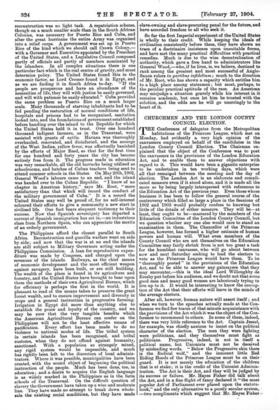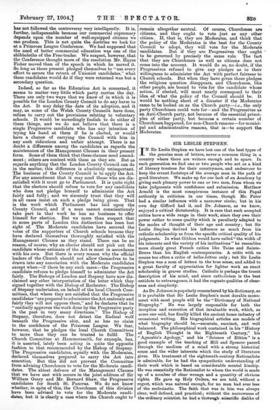CHURCHMEN AND THE LONDON COUNTY COUNCIL ELECTION.
Monday, had evidently a very high opinion of the canvassers employed on behalf of the candidates in the London County Council Election. The Chairman ex- plained that the object of the Conference was to post the canvassers in the provisions of the London Education Act, and to enable them to answer objections with regard to it. This would have been a gigantic enterprise to be undertaken in ten working days, which were all that remained between the meeting and the day of election. The London Act is an elaborate and compli- cated measure even if it stood alone, and it is made all the more so by being largely interspersed with references to the Education Act of the previous year. Even those whose business it has been to follow the general course of the controversy which filled so large a place in the Sessions of 1902 and 1903 would probably confess to knowing but little of the details of either measure. They will be—at least, they ought to be—mastered by the members of the Education Committee of the London County Council, but we question whether any one else would care to stand an examination in them. The Chancellor of the Primrose League, however, has formed a higher estimate of human powers and human will. What even members of the County Council who are not themselves on the Education Committee may fairly shrink from is not too great a task for the humblest canvasser, who will go about between now and next Saturday seeking to lead the electors to vote as the Primrose League would have them. To be "thoroughly posted" in the provisions of the Education Act, and to be able to answer any gainsayers that they may encounter,—this is the ideal Lord Willoughby de Eresby put before his audience, and we doubt not that some good men and many good women are laboriously trying to live up to it. It would be interesting to know the concep- tion of the Act that their efforts will leave in the minds of the average electors.
After all, however, human nature will assert itself ; and when we turn to the speeches actually made at the Con- ference we find few traces of that minute acquaintance with the ,provisions of the Act which it was the object of the Con- ference to recommend to others. In some of them, indeed, there was very little reference to the Act. Captain Jessel, for example, was chiefly anxious to insist on the political character of the election. The men they were fighting were politicians, and they themselves must fight as politicians. Progressive, indeed, is not in itself a political name, but Unionists must not be deceived by misleading words. "Below the Progressive skin there is the Radical wolf," and the innocent little Red Riding Hoods of the Primrose League must be on their• guard. It is not merely the education of the children that is at stake ; it is the credit of the Unionist Adminis- tration. The Act is their Act, and they will be judged by its success or failure. Mr. Hayes Fisher did talk about the Act, and in a fine flight of fancy declared it "the most popular Act of Parliament ever placed upon the statute- book," and the only alternative to a purely secular system, • —two compliments which suggest that Mr. Hayes Fisher..- has not followed the controversy very intelligently. It is, further, indispensable because our commercial supremacy depends upon the number of well-equipped citizens we can produce. This is not quite the doctrine we look for at a Primrose League Conference. We had supposed that the need of better commercial education was one of the shibboleths of the Free-trader. We suspect, however, that the Conference thought more of the resolution Mr. Hayes Fisher moved than of the speech in which he moved it. So long as those present pledged themselves to "use every effort to secure the return of Unionist candidates," what these candidates would do if they were returned was but a secondary question.
Indeed, so far as the Education Act is concerned, it seems to matter very little which party carries the day. There are only two ways that we know of in which it is possible for the London County Council to do any harm to the Act. It may delay the date of its adoption, and it may, as some of the Welsh County Councils have done, refuse to carry out the provisions relating to voluntary schools. It would be exceedingly foolish to do either of these things, and we do not believe that there is a single Progressive candidate who has any intention of trying his hand at them if he is elected, or would have a chance of carrying the Council with him in any such ridiculous and unfair attempt. There is no doubt a difference among the candidates as regards the maintenance of the Management Clauses in their present form. Some of them think that these clauses need amend- ment; others are content with them as they are. But as regards anything that the London County Council can do in the matter, this difference is absolutely unimportant. The business of the County Council is to apply the Act. For any amendment that it may need those who are dis- satisfied with it must go to Parliament. It is quite right that the electors should refuse to vote for any candidate who does not pledge himself to administer the Act fairly and fully ; and we sincerely trust that they will in all cases insist on such a pledge being given. That is the work which Parliament has laid upon the County Council, and if a man cannot conscientiously take part in that work he has no business to offer himself for election. But we more than suspect that in some parts of London this distinction has been lost sight of. The Moderate candidates have secured the votes of the supporters of Church schools because they have declared themselves thoroughly satisfied with the Management Clauses as they stand. There can be no reason, of course, why an elector should not pick out the candidate whose estimate of the Act is most in accordance with his own. But there is every reason why the official leaders of the Church should not allow themselves to be drawn into any association with the Moderate candidates except when—if there be any such cases—the Progressive candidate refuses to pledge himself to administer the Act fairly. The Bishops of London and Stepney have now dis- claimed any other interpretation of the letter which they signed together with the Bishop of Rochester. The Bishop of Stepney undertakes, on behalf of the local Church Com- mittees, that where they are satisfied that the Progressive candidates "are prepared to administer the Act zealously and fairly they will not oppose them," and be declares that he "cordially approves the work done by the Progressive party in the past in very many directions." The Bishop of Stepney, therefore, does not detect the Radical wolf beneath the Progressive skin, and so has no claim to the confidence of the Primrose League. We fear, however, that he pledges the local Church Committees to more than they can be trusted to fulfil. The Church Committee at Hammersmith, for example, has, it is asserted, lately been acting in quite the opposite fashion to that recommended by the Bishop of Stepney. The Progressive candidates, equally with the Moderates, declared themselves prepared to carry the Act into execution. But this did not prevent the Committee from advising Churchmen to vote for the Moderate candi- dates. The ablest defence of the Management Clauses that we have met with occurs in the joint address of Sir William Geary and Mr. Bernard Shaw, the Progressive candidates for South St. Pancras. We do not know whether, in spite of this, the Churchmen of this division have been advised to vote for the Moderate candi- dates, but it is clearly a case where the Church ought to .remain altogether neutral. Of course, Churchmen are citizens, and they ought to vote just as any other citizen. If, that is, they are Moderates, and think that the policy of the Moderates is the best for the County Council to adopt, they will vote for the Moderate candidates. But if they are Progressives they ought to be governed by precisely the same rule. The fact that they are Churchmen as well as citizens does not come into the account. It would do so, no doubt, if the Progressives refused to give any pledges as to their willingness to administer the Act with perfect fairness to Church schools. But when they have given these pledges the religious question disappears, and Churchmen, like other people, are bound to vote for the candidate whose action, if elected, will most nearly correspond to their idea of what the policy of the Council should be. It would be nothing short of a disaster if the Moderates came to be looked on as the Church party—i.e., the only party Churchmen could vote for—and the Progressives as an Anti-Church party, not because of the essential princi- ples of either party, but because a certain number of Churchmen happened, for non-Church reasons—for munici- pal and administrative reasons, that is—to support the Moderates.











































 Previous page
Previous page